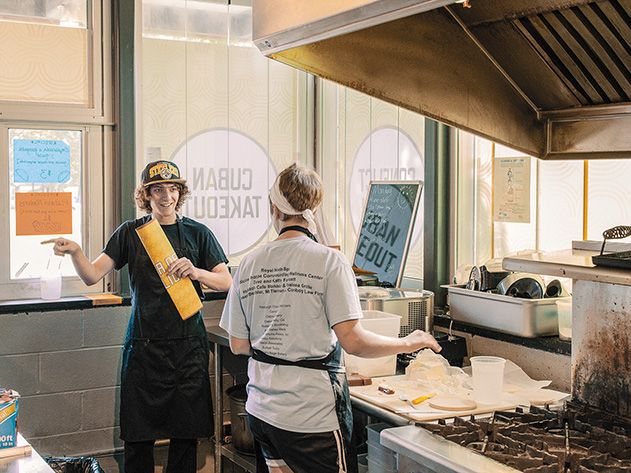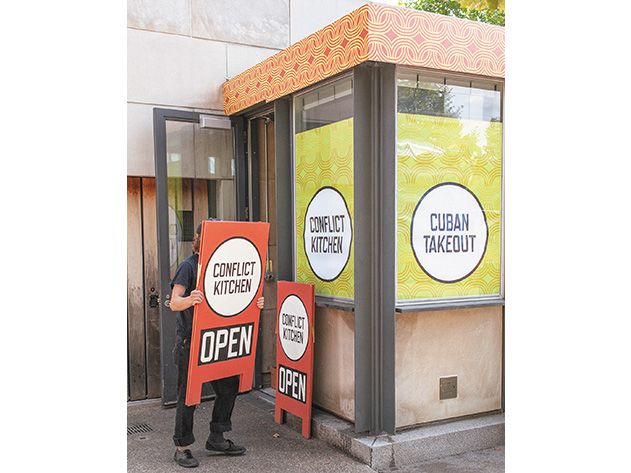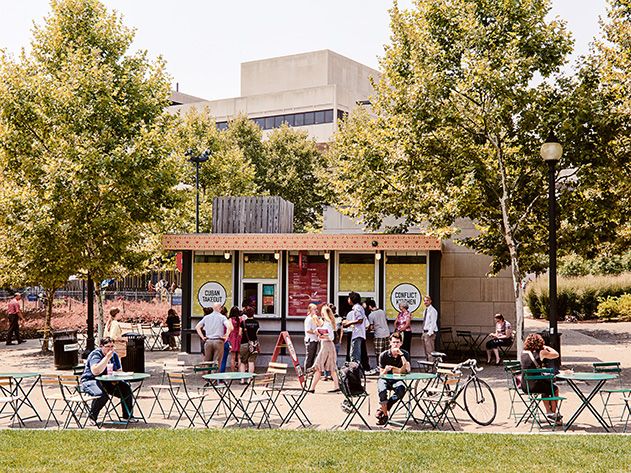Where War Is What’s for Dinner
Pittsburgh’s Conflict Kitchen has a global menu, with dishes from countries that have diplomatic problems with the U.S.
/https://tf-cmsv2-smithsonianmag-media.s3.amazonaws.com/filer/40/05/4005abb2-c2d6-4aca-adf5-86ac39c85acd/0global-food-fight-conflict-kitchen-1.jpg)
In an era when celebrity chefs and avant-garde gastronomes have seemingly exhausted every culinary concept, a takeout joint in Pittsburgh is making a stir with a unique menu: Conflict Kitchen only serves dishes from nations that the United States is at odds with. “This is a place on the street level where we can unpack politics together, using food as a storytelling device,” said co-founder Jon Rubin, a Carnegie Mellon University art professor.
The eatery, located in the city’s Schenley Plaza, defines conflict broadly as war, boycotts, embargoes, military clashes and diplomatic quarrels. As policy makers debated troop withdrawals from Afghanistan, the specialty was bolani (savory turnovers stuffed with spinach, red lentils or potatoes). Amid concerns over Iran’s nuclear program, there was kubideh (seasoned ground beef wrapped in flatbread). For the Persian theme, the restaurant staged dinner at a house nearby at which guests Skyped with people in Iran who were eating the same dishes.
The current theme is Cuba, which has been subjected to a U.S. trade embargo since 1960, and I enjoyed lechon asado (marinated, slow-roasted pork) and fried yucca chips, washed down with mango agua fresca. The menu, culinary director Robert Sayre said, was designed after Conflict Kitchen staff had visited Cuba to research recipes. Each dish came with a pamphlet featuring interviews they had conducted with Cubans talking about day-to-day life. If the embargo were lifted, “maybe more tourists would come,” one said, but “our political situation wouldn’t change.” Still, the restaurant says it doesn’t want to force-feed diners ideology; about half just go for the grub.
Since its founding in 2010, Conflict Kitchen has been lauded for dishes as tasty as they are enlightened. Pittsburgh magazine praised the “food for thought,” and the city’s Islamic Center gave it a humanitarian business award.
Now the restaurant is taking its activism to another level. For its scheduled Korean theme this winter, Conflict Kitchen is consulting with an organization that helps North Korean refugees settle in South Korea, restaurant co-founder Dawn Weleksi said via Skype from Seoul.
Most gratifying, Rubin says, people abroad as well as in the United States have asked about establishing franchises. So far there are no plans to expand, but a chain of Conflict Kitchens would certainly be a philosophical change of pace from the typical U.S.-based fast-food empire. “The initial point was to teach Americans about other cultures, but it’s turned out to work both ways,” Sayre says. “We’ve gotten people coming here and saying things like, ‘I saw you on Al Jazeera, and it changed the way I thought about Americans.’”
/https://tf-cmsv2-smithsonianmag-media.s3.amazonaws.com/accounts/headshot/joseph-stromberg-240.jpg)



/https://tf-cmsv2-smithsonianmag-media.s3.amazonaws.com/accounts/headshot/joseph-stromberg-240.jpg)